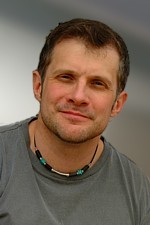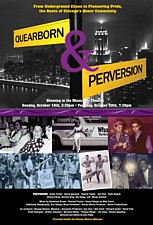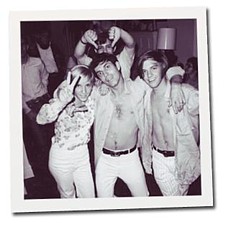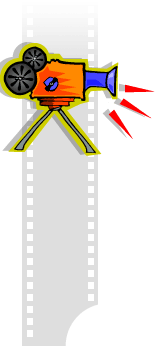
Close Encounters of the Celebrity Kind...
All Roads Lead to Quearborn & Perversion - Talking with Filmmaker Ron Pajak
10-14-09 Windy City Times Q&A
by Richard Knight, Jr.
10-14-09 Windy City Times Q&A
by Richard Knight, Jr.
Pajak, the film poster and just one of the fascinating archival photos included in Pajak's illuminating social history of queer Chicago
Two years ago I experienced one of those singular cinema experiences that any film fanatic lives for – the catharsis that occurs when
what is happening on screen is experienced simultaneously by the audience, magically transformed by the flickering images in front
of them into one shared consciousness. The occasion was a screening at the Chicago History Museum of Quearborn &
Perversion, a late entry into that year’s Reeling Film Festival. Sitting in the dark with my audience of fellow queers (of all stripes
and shapes), we as one embraced director Ron Pajak’s moving, insightful, painful, and often very funny social history of Chicago’s
gay history.
Since that screening, out filmmaker and native Chicagoan Pajak has tinkered with his baby – a ten year labor of love – until it is now
ready for its world premiere. This will occur on Sunday, Oct. 18 at 3:30pm and again on Tuesday, Oct. 20 at 7:30pm – both at the
Music Box Theatre (3733 N. Southport). Pajak, who will appear at both screenings, was excited to talk with Windy City Times about
Quearborn & Perversion (the title is the nickname for Chicago’s one time infamous hustler cruising spot located at Dearborn &
Division).
WINDY CITY TIMES (WCT): Why has it taken over ten years for the film to come together?
RON PAJAK (RP): I knew it was going to take a while because early on I made a decision that I wanted it to be as diverse as
possible. If I wanted to make a white, gay guy movie I would have been done nine years ago because that was easy to find. But I
just didn’t want to do that. I had no connections to people of color or to older lesbians and that’s what took a lot of patience and
time. A lot. But eventually it worked out. Once I got the critical mass of my subjects is really when I started diving into doing the
research regarding all the archival materials and the photos to go along with the stories that I had collected.
WCT: Where did you go to do that?
RP: Well that added another layer of complication and another reason why it took so long because there’s just no resource for, “I
want pictures of gay men in the 1940s.” Libraries don’t have that. Books like that don’t exist. So it was really a lot of private
investigative work. Most of the archives were just personal archives from subjects or word of mouth. They came from people who
aren’t in the film but are of the era. But they’re all from Chicago – everything you see in the film is from Chicago. I was a stickler
about that. I was pretty much asking almost everyone I ran into in my life whether they knew someone who had archive material –
it just became this pitch and every so often I got lucky with someone who had home movies or photographs. I wasn’t going to start
editing the film until I had a comfortable amount of archival material because what I didn’t want was the film to be just a “talking
head film.”
WCT: Was the Gerber-Hart Library a resource for you at all?
RP: Yes it was but a bigger, primary resource was the Chicago History Museum. They were a wonderful resource for many things.
They also have an incredible archival staff that did a lot of work for me. They’re a co-producer on the film and this is one of the few
they’ve done that on.
WCT: Did you run into some people who were reticent to talk to you?
RP: Sure, it’s not like everyone I talked to said “Yes.” I was rarely refused personally but people who I met would say, “Oh, I’ve
got friends” and then they would talk to the friends and some would and some expressed no interest at all. It was definitely more
difficult early on with older women. I think that women in general a little bit more camera shy or not as narcissistic – really. Even
more interestingly, many more women than men were married and had families. Even though they’ve been out for decades they
had children or grandchildren and I think that gave them pause regarding being on camera. It just took some connections.
WCT: When I first saw the film at the History Museum as part of the Reeling Festival two years ago that was such a stunning
revelation – those home movies were like a hidden history revealed.
RP: Thank you. What I showed at Reeling was really a work in progress and I believe that what I’ve put together now is a little bit
tighter, a little bit more polished. I put in some material that wasn’t quite ready yet. There is new material toward the end of the
film – the African American sequence and the lesbian/feminist sequence. Then I went through and pared down each of the
sequences so I could fit in the new ones and not have a 6 ½ hour miniseries. The goal was to get it down under two hours.
WCT: You must have some amazing extras that didn’t make this final cut.
RP: Oh, an incredible amount. It was so painful to cut things out. It was like killing my own children (laughs) because there were
so many things that couldn’t be in the final version because people just don’t want to sit that long for this kind of piece. It’s not a
narrative piece where you have sexy, big stars on the screen. It’s a historical documentary and it’s pretty dense. There was just no
way around so yeah, there’s going to be some wonderful DVD extras at some point – I hope.
WCT: The film ends with Chicago’s first gay pride parade which sets us up perfectly for a sequel. Will you go on to do a part two to
cover what came after?
RP: My original plan was to do a trilogy. Part two would be the liberation-disco era right up until we got AIDS. Then Part three would
start with 1987 when Chicago passed the gay rights ordinance which also happened to be when HIV-AIDS really exploded here. But
making this film – my first feature – has shown me that it’s just really difficult to get funding. I have the vision but trying to get the
appropriate amount of funds to make these kinds of films was difficult before the current economic downturn and now, it’s pretty
much impossible. But if someone came along and sponsored me I’d sign up immediately.
www.quearbornandperversion.com
what is happening on screen is experienced simultaneously by the audience, magically transformed by the flickering images in front
of them into one shared consciousness. The occasion was a screening at the Chicago History Museum of Quearborn &
Perversion, a late entry into that year’s Reeling Film Festival. Sitting in the dark with my audience of fellow queers (of all stripes
and shapes), we as one embraced director Ron Pajak’s moving, insightful, painful, and often very funny social history of Chicago’s
gay history.
Since that screening, out filmmaker and native Chicagoan Pajak has tinkered with his baby – a ten year labor of love – until it is now
ready for its world premiere. This will occur on Sunday, Oct. 18 at 3:30pm and again on Tuesday, Oct. 20 at 7:30pm – both at the
Music Box Theatre (3733 N. Southport). Pajak, who will appear at both screenings, was excited to talk with Windy City Times about
Quearborn & Perversion (the title is the nickname for Chicago’s one time infamous hustler cruising spot located at Dearborn &
Division).
WINDY CITY TIMES (WCT): Why has it taken over ten years for the film to come together?
RON PAJAK (RP): I knew it was going to take a while because early on I made a decision that I wanted it to be as diverse as
possible. If I wanted to make a white, gay guy movie I would have been done nine years ago because that was easy to find. But I
just didn’t want to do that. I had no connections to people of color or to older lesbians and that’s what took a lot of patience and
time. A lot. But eventually it worked out. Once I got the critical mass of my subjects is really when I started diving into doing the
research regarding all the archival materials and the photos to go along with the stories that I had collected.
WCT: Where did you go to do that?
RP: Well that added another layer of complication and another reason why it took so long because there’s just no resource for, “I
want pictures of gay men in the 1940s.” Libraries don’t have that. Books like that don’t exist. So it was really a lot of private
investigative work. Most of the archives were just personal archives from subjects or word of mouth. They came from people who
aren’t in the film but are of the era. But they’re all from Chicago – everything you see in the film is from Chicago. I was a stickler
about that. I was pretty much asking almost everyone I ran into in my life whether they knew someone who had archive material –
it just became this pitch and every so often I got lucky with someone who had home movies or photographs. I wasn’t going to start
editing the film until I had a comfortable amount of archival material because what I didn’t want was the film to be just a “talking
head film.”
WCT: Was the Gerber-Hart Library a resource for you at all?
RP: Yes it was but a bigger, primary resource was the Chicago History Museum. They were a wonderful resource for many things.
They also have an incredible archival staff that did a lot of work for me. They’re a co-producer on the film and this is one of the few
they’ve done that on.
WCT: Did you run into some people who were reticent to talk to you?
RP: Sure, it’s not like everyone I talked to said “Yes.” I was rarely refused personally but people who I met would say, “Oh, I’ve
got friends” and then they would talk to the friends and some would and some expressed no interest at all. It was definitely more
difficult early on with older women. I think that women in general a little bit more camera shy or not as narcissistic – really. Even
more interestingly, many more women than men were married and had families. Even though they’ve been out for decades they
had children or grandchildren and I think that gave them pause regarding being on camera. It just took some connections.
WCT: When I first saw the film at the History Museum as part of the Reeling Festival two years ago that was such a stunning
revelation – those home movies were like a hidden history revealed.
RP: Thank you. What I showed at Reeling was really a work in progress and I believe that what I’ve put together now is a little bit
tighter, a little bit more polished. I put in some material that wasn’t quite ready yet. There is new material toward the end of the
film – the African American sequence and the lesbian/feminist sequence. Then I went through and pared down each of the
sequences so I could fit in the new ones and not have a 6 ½ hour miniseries. The goal was to get it down under two hours.
WCT: You must have some amazing extras that didn’t make this final cut.
RP: Oh, an incredible amount. It was so painful to cut things out. It was like killing my own children (laughs) because there were
so many things that couldn’t be in the final version because people just don’t want to sit that long for this kind of piece. It’s not a
narrative piece where you have sexy, big stars on the screen. It’s a historical documentary and it’s pretty dense. There was just no
way around so yeah, there’s going to be some wonderful DVD extras at some point – I hope.
WCT: The film ends with Chicago’s first gay pride parade which sets us up perfectly for a sequel. Will you go on to do a part two to
cover what came after?
RP: My original plan was to do a trilogy. Part two would be the liberation-disco era right up until we got AIDS. Then Part three would
start with 1987 when Chicago passed the gay rights ordinance which also happened to be when HIV-AIDS really exploded here. But
making this film – my first feature – has shown me that it’s just really difficult to get funding. I have the vision but trying to get the
appropriate amount of funds to make these kinds of films was difficult before the current economic downturn and now, it’s pretty
much impossible. But if someone came along and sponsored me I’d sign up immediately.
www.quearbornandperversion.com



